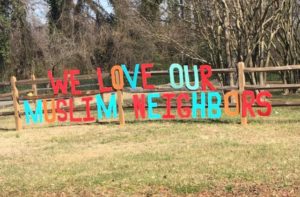BY PETER ST. ONGE
April 12, 2017
Associate Editor, Editorial Pages
Charlotte Observer

Kate Murphy was driving to work in East Charlotte not long ago when she saw a car that looked like it had some words painted on it. She pulled up for a closer look and saw that yes, they were words. But they were more than words. They were anti-Muslim slurs.
This was back in February, shortly after the Donald Trump administration had issued its first executive order banning people from seven Muslim countries from entering the United States. That order, you remember, was struck down in court and scorned by many. But plenty of people also thought it was exactly what the country should do.

“There was so much being said that troubled me,” said Murphy, who is pastor of The Grove Presbyterian Church.
So one weekday morning, after talking with church members, she decided to put up a sign in the church’s front yard.
“We love our Muslim neighbors,” it said simply, in big and colorful letters that faced W.T. Harris Blvd.
This is a story about the power of words, but it’s also about something more powerful. It’s about gestures. As a pastor, you get to talk about those kinds of things, but usually it’s on Sunday morning, facing your congregation. Murphy thought there was something more her church needed to say.
She didn’t want to make a political statement on immigration, and she didn’t want to get tangled in culture wars. But there were some Muslim families who’d taken part in after-school activities at The Grove. She thought of them and others seeing that car with the slurs in the neighborhood.
Let’s pause here for what the church didn’t do. It didn’t announce the church sign was coming, and it didn’t send out a press release after it went up. I’ve known Kate Murphy since interviewing her more than a decade ago, but I had to call her about the sign, which I’d heard about from someone else.
By then, others had heard about it, too. One Muslim woman took a picture of it driving by and posted it on Facebook. Another wrote about it on Reddit. Soon, the emails began arriving in Murphy’s inbox, first from Charlotte but then from other places. Most were supportive, a few not so much.
One of those emails came from a mile down the road, at a place called the Charlotte Islamic Academy. A teacher had seen the sign and talked about it with her students. Some of them had seen the sign, too. They’d written cards to The Grove in response.
The cards arrived a couple of days later. Most were handmade, from students in the 7th through 12th grades. They were heartening and heartbreaking at the same time.
They thanked the Grove for having the courage to put up the sign. They talked about how seeing it brought a smile, or tears. One student said he’d made it a screen saver on his computer.
“Thank you for standing up for us and supporting us, even when most of the world is against us,” said another.
It was, Murphy says, an affirmation that she’d done the right thing. “As churches, we really do have the power to do something to change the conversation,” she says.
But she also remembers one other email she received. “A sign is easy,” it said. “What we need are relationships.”
A relationship
About that time, Rose Hamid read about the church sign in a friend’s post on Facebook. “Oh, how nice,” she thought, then had another.
Hamid, who’s an active advocate for Muslims in Charlotte, went to The Grove’s website and found that on one Thursday evening a month, the church hosts a community dinner. She called to see if maybe the Muslim community could sponsor the next dinner.
That would be in April, she was told, and that dinner happened to fall on the Christian holiday, Maundy Thursday.
Hamid also was told the church would be blending the community dinner and the Maundy Thursday service, and that they had planned to serve the type of food that was served in Middle Eastern countries.
“Well,” she said, “that’s right up my alley.”
They will gather tonight for a simple meal, with everyone sitting at one U-shaped table so they can pass around food and talk as one. Hamid will bring a jar of honey and figs from Palestine, where her brother lives.
Both she and Murphy want the other to be as comfortable as possible with how things go. Hamid wants Murphy to know its not her group’s intention to intrude on the dinner or service. Murphy wants Hamid to know that they are very welcome – but not obligated – to participate.
It’s a beautiful service, Murphy says. After they eat, someone will read from the Gospel of John, which recounts how Jesus washed his disciples’ feet on the night before he was crucified. Then people at the dinner will be invited to do the same. For centuries, it’s been a simple act of humility. A gesture, shared.
Originally Published in the Charlotte Observer April 12, 2017
